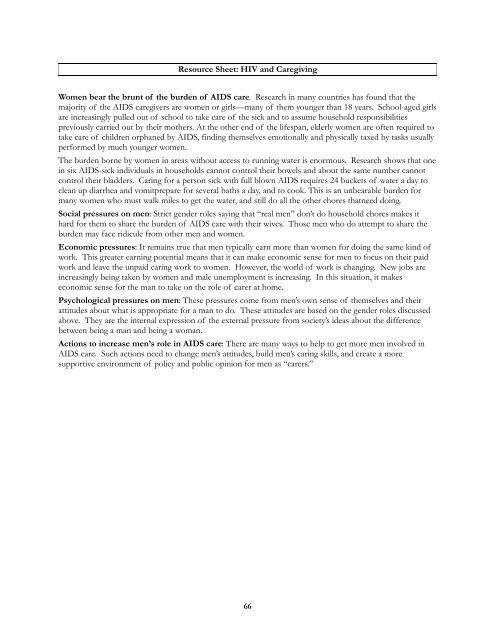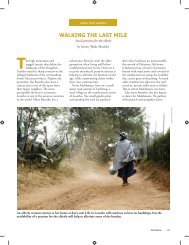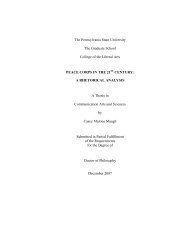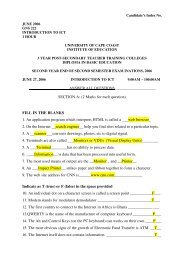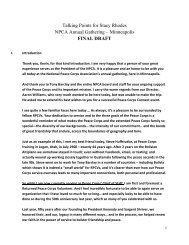Group Education Manual - Peace Corps Wiki
Group Education Manual - Peace Corps Wiki
Group Education Manual - Peace Corps Wiki
You also want an ePaper? Increase the reach of your titles
YUMPU automatically turns print PDFs into web optimized ePapers that Google loves.
Resource Sheet: HIV and CaregivingWomen bear the brunt of the burden of AIDS care. Research in many countries has found that themajority of the AIDS caregivers are women or girls—many of them younger than 18 years. School-aged girlsare increasingly pulled out of school to take care of the sick and to assume household responsibilitiespreviously carried out by their mothers. At the other end of the lifespan, elderly women are often required totake care of children orphaned by AIDS, finding themselves emotionally and physically taxed by tasks usuallyperformed by much younger women.The burden borne by women in areas without access to running water is enormous. Research shows that onein six AIDS-sick individuals in households cannot control their bowels and about the same number cannotcontrol their bladders. Caring for a person sick with full blown AIDS requires 24 buckets of water a day toclean up diarrhea and vomitprepare for several baths a day, and to cook. This is an unbearable burden formany women who must walk miles to get the water, and still do all the other chores thatneed doing.Social pressures on men: Strict gender roles saying that “real men” don’t do household chores makes ithard for them to share the burden of AIDS care with their wives. Those men who do attempt to share theburden may face ridicule from other men and women.Economic pressures: It remains true that men typically earn more than women for doing the same kind ofwork. This greater earning potential means that it can make economic sense for men to focus on their paidwork and leave the unpaid caring work to women. However, the world of work is changing. New jobs areincreasingly being taken by women and male unemployment is increasing. In this situation, it makeseconomic sense for the man to take on the role of carer at home.Psychological pressures on men: These pressures come from men’s own sense of themselves and theirattitudes about what is appropriate for a man to do. These attitudes are based on the gender roles discussedabove. They are the internal expression of the external pressure from society’s ideas about the differencebetween being a man and being a woman.Actions to increase men’s role in AIDS care: There are many ways to help to get more men involved inAIDS care. Such actions need to change men’s attitudes, build men’s caring skills, and create a moresupportive environment of policy and public opinion for men as “carers.”66


